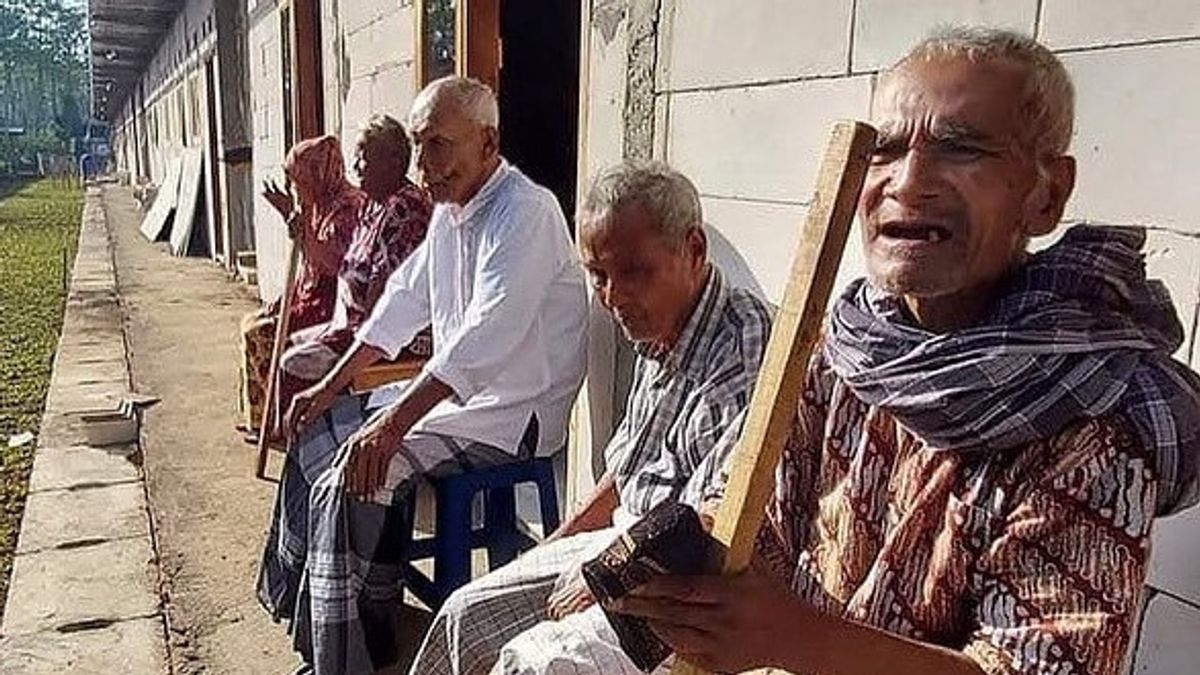JAKARTA - A statement from three children handing over their biological mother to a nursing home has gone viral. This news has become a norm debate. Many adopt a Western perspective, where this tends to be more normal. The argument, although dominant, unfortunately, fails to meet logic.
The letter included the name of Mrs. Trimah, a 65-year-old woman who lives in Magelang, Central Java. Trimah's three children submitted the signed statement to the Griya Lansia Husnul Khotimah nursing home, Malang, East Java.
"Agreeing to hand over the care of our parents to Griya Lansia Husnul Khatimah Malang, because we are busy," the letter said, quoted by VOI, Monday, November 1.
"If our parents die, then we hand over the funeral process for our parents to Griya Lansia Husnul Khatimah. This certificate was made without coercion from any party," the letter continued.
The letter was uploaded to the Instagram account @malangdonasi. In the upload, it is explained that Mrs. Trimah is now unable to walk and can only crawl. It was also explained why the account uploaded a statement from Mrs. Trimah's three children.
"Hopefully we can learn a lesson," wrote Griya Lansia Husnul Khotimah.
"We from GRIYA LANSIA HUSNUL KHOTIMAH MALANG, state that we are READY to care for Mrs. Trimah until she dies," they continued.
Mrs. Trimah has spoken to the mass media. He admitted that he really felt at home at Griya Lansia Husnul Khotimah although he still hoped to be picked up by his children again. Mrs. Trimah also explained that her three children are already married. Two live in Jakarta. Another one in Pekalongan, Central Java.
Another viral video circulated, following the many statements from Mrs. Trimah's three children. The video features an audio recording, with a woman's voice claiming to be one of Mrs. Trimah's children. The woman refused to be called dumping Mrs. Trimah.
According to him, other siblings have taken care of Mrs. Trimah since Mrs. Trimah had her first stroke. However, the woman in the audio said that Mrs. Trimah often throws tantrums, provokes a commotion with her own daughter-in-law and grandchildren.
"From the beginning of the first stroke, she was taken care of by her youngest child. But she always throws tantrums, every day she fights with her in-laws and grandchildren. Until my brother is confused about what to do ... Finally my younger brother is not strong, "said the woman in audio.
The woman also said that the reason they entrusted Mrs. Trimah was so that Mrs. Trimah could be guided by Griya Lansia Husnul Khotimah. "They said it was like a lodge there. They would be guided. 'We'll teach you worship.' ... Then I had to take it there."
We tried to verify the validity of the audio to the manager of the Jelajah Story channel who was the first uploader of female voice audio. However, as of this writing, there has been no response.
Norm debate

Of course, we are not in the capacity to judge the decisions of Trimah's three children. What is clear is that the norm debate is interesting. A number of narratives were raised. Most expressed their vision of old age. Some are preparing to live in a nursing home. Others pray that their child will not be like the three children of Mrs. Trimah.
"It's very hard to swear. The only thing left is the busy life. If you can just resign. That's your mother, son. But believe me, there must be sustenance from other sources and we won't expect it. This is just from personal experience," wrote the account @jaessthetics.
Another account, @urssmile wrote: Stupid is very close-minded. But I can't bear to leave my parents, even in a nursing home. I hope I have sustenance to take care of my parents. I'm busy at work and I'm sure I won't be working all day. There must be some free time for them. Hire nanny, cake or something, I can't bear it. Loudly crying face.
Another narrative that is quite dominant in this debate is the comparative narrative between the perspectives of 'Indo people' and Westerners. For example, the narration put forward by the account @auxiliaries_, which wrote: Indo people are really surprised when they see other people consciously choosing to keep their parents in a nursing home. Excessive social construct.
Western and Middle Eastern System

In Indonesia
In Indonesia, the two views above are co-exist. The difference is social class. The upper-middle-class, who have economic resources, began to apply the Western system. In contrast, the poor still adhere to the Middle Eastern system, with most of them taking care of their own parents. Which one is dominant?
Data from the National Socio-Economic Survey (Susenas) held by the Indonesian Geriatrics Society (IGS) in March 2019 showed that 40.46 percent of the elderly lived with three generations or extended families, from grandmother to grandchildren. Another 27.3 percent live with family. The rest live with spouses and others.
This tendency is also the basis for the design of policies for empowering the elderly in Indonesia. The Ministry of Social Affairs (Kemensos) has several key programs. First Assistant National Rehabilitation (ATENSI). This policy is aimed at strengthening the social rehabilitation system that is integrated with the protection of the elderly.

Our business
"In the modern era, this is difficult to happen, where the duration of work for some people is much longer, which is very likely to be difficult to allocate time for social activities if it has to be done every day."
The founder of modern sociology, Emile Durkheim has described this in many of his theoretical foundations. That the rigid and strict system and pattern of modern human work also encourage human relations within it.
"Making the perpetrator (the worker) must be obedient to his work institution. Then the time allocation for taking care of others will be very less. Especially if he has to take care of his parents. Meanwhile, he himself has a family to take care of."
"So what happened to the family above is only a process that could happen along with changes in the living system. Maybe the problem is only in the aspect of politeness, which is unusual in the cultural system of Indonesian society," said Tantan.
*Read other information about VIRAL or read other interesting articles from Yudhistira Mahabharata.
Other NEWS
VOIR éGALEMENT:
The English, Chinese, Japanese, Arabic, and French versions are automatically generated by the AI. So there may still be inaccuracies in translating, please always see Indonesian as our main language. (system supported by DigitalSiber.id)














